
Secretary for Transport and Logistics

January 18, 2025
The development of Hong Kong's maritime and port industry has garnered significant attention. In the Legislative Council, Hon. Lam San-keung proposed a Members’ Motion last Wednesday (January 8) titled "Enhancing Hong Kong’s Status as an International Maritime Services Centre". Many members offered valuable suggestions on how to elevate Hong Kong's position as an International Maritime Centre (IMC). I was leading members of the Hong Kong Logistics Development Council (LOGSCOUNCIL), along with colleagues from Hong Kong Customs and Excise Department and the Marine Department, on a visit to Guangxi to explore logistics cooperation. Although I was unable to exchange with the legislators in person during the Motion Debate, I took some time to review their opinions afterwards. Hong Kong's port logistics industry boasts a century of excellent legacy, but in the face of the continuously evolving global landscape of shipping and logistics, we must also keep pace with change and speed. In today's blog, I will share with you all the latest development and our upcoming efforts in Hong Kong's maritime and logistics industry.
Port Industry
Hong Kong's shipping industry comprises two main sectors: maritime services and port. Earlier, under the arrangement of the Hong Kong Container Terminal Operators Association, I inspected the operations of the Kwai Chung Container Terminal and engaged in in-depth discussions with three terminal operators. I was able to witness the arrival of the largest batch of Chilean cherry of the month, with around 3,700 TEUs of fresh cherries. Within a few hours, these cherries could be delivered to the South China region. As I was watching truck after truck waiting to pick up the cherries, I felt a sense of confidence, knowing that we can overcome challenges facing Hong Kong ports with our concerted efforts. If you are interested in understanding the visit, you can refer to our Facebook post.
Maritime Services
Maritime services are the high-value-added segment of the shipping industry, with economic contributions increase by nearly 40% from 2019 to 2022 and I see immense potential in the ship management services in Hong Kong.
First, let’s provide some information: ship management companies are professional teams that offer technical management, crew management, regulatory compliance, operational management, and financial management services to shipowners. They manage a diverse range of vessel types and can provide various services to enhance operational efficiency, such as voyage optimisation solutions and recommendations to reduce fuel consumption, through their own operational systems and big data management and analysis systems. Currently, the global shipping industry faces numerous challenges, and some new shipowners are investors like private equity funds and export credit agencies that are not directly involved in the shipping industry. Professional management teams can provide these shipowners with optimal operational solutions.
There are over 300 shipping agents and managers, as well as overseas shipping companies' representative offices in Hong Kong now, employing approximately 5,500 people. The demand for ship management services has also fostered the development of other professions, such as ship financing, maritime mediation and insurance, creating a vibrant maritime ecosystem in the region.
More importantly, Hong Kong's ship management services have a long history and are renowned worldwide. Among the top 10 ship management companies globally listed by the shipping authority Lloyd's List, five have operations in Hong Kong, with three of them headquartered here, making Hong Kong the region with the most headquarters among the top 10. These include Anglo-Eastern Ship Management, ranked first, Fleet Management Limited, ranked third, and Wallem Group, ranked ninth. To understand Hong Kong's strengths and future potential, we must also make reference to the development of these top companies in Hong Kong over the years.
Anglo-Eastern was founded in 1974, and Hong Kong has been their operational headquarters since they established. They provide a comprehensive range of management services utilising various innovative technologies, including newbuilding supervision, alternative fuel advisory, and retrofit consultancy, among others. Their award-winning Anglo-Eastern Maritime Academy in India allows additional 500 trained seafarers onboard annually.
Fleet Management Limited was also founded in Hong Kong. Although it has only been 30 years since its establishment in 1994, it has rapidly risen to become the third-largest ship management company worldwide. They leverage breakthrough, proprietary technology to offer clients a one-stop platform for real-time vessel data monitoring, predictive maintenance, and seamless communication between onshore teams and crews at sea.
Wallem Group was established in Shanghai but began operations in Hong Kong in 1925, welcoming its 100th anniversary in the city this year. They are known for their bespoke services, providing ship management, agency services, commercial services, lifeboat safety, and compliance consulting tailored to each client's needs.
While the development directions of these three companies may differ, they share a same commitment to continuous reform and adaptation throughout their growth. They also express confidence in the Hong Kong market environment. They all recognise Hong Kong's strategic global connectivity, well-developed maritime ecosystem, robust common law system, international and business-friendly environment, and an enormous pool of professional talent as significant advantages. Additionally, the HKSAR government has launched a series of measures to enhance Hong Kong's shipping competitiveness, including continuously optimising competitive tax incentives, reforming the current Hong Kong Maritime and Port Board, conducting alternative fuel research, and providing talent training, all of which affirm their belief in the Government's commitment to promoting the development of Hong Kong's Maritime industry.
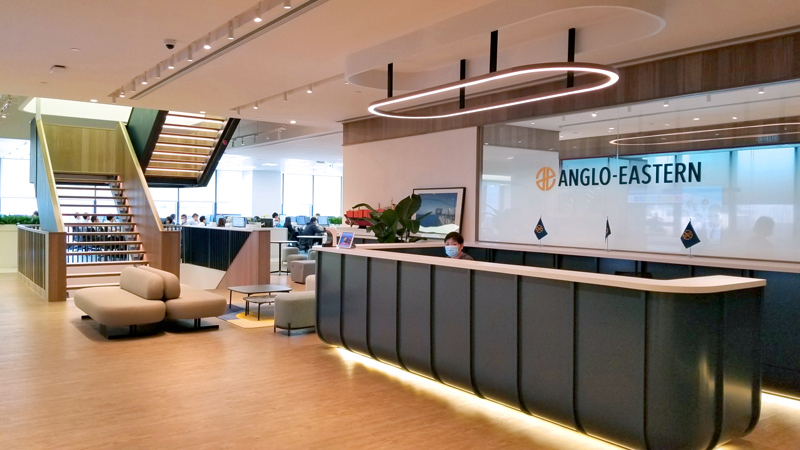

Anglo-Eastern Ship Management Limited is headquartered in Kowloon Bay and manages over 1,200 vessels worldwide.
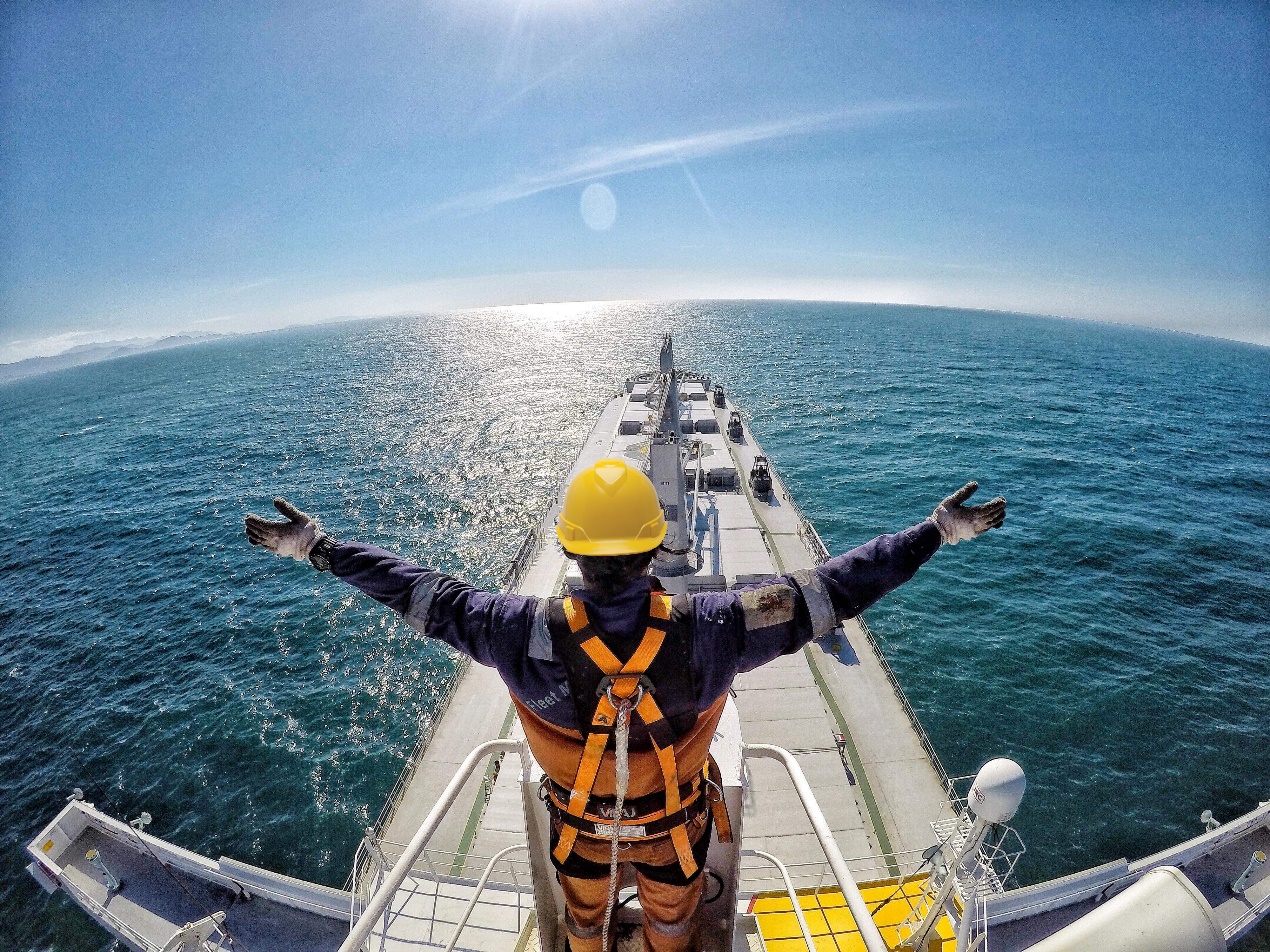
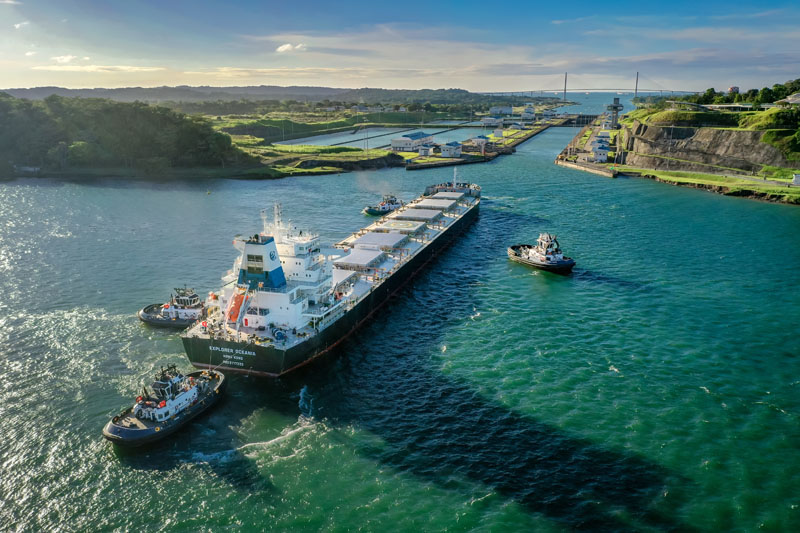
In just thirty years since its establishment, Fleet Management Limited has become the world's third-largest ship management company.
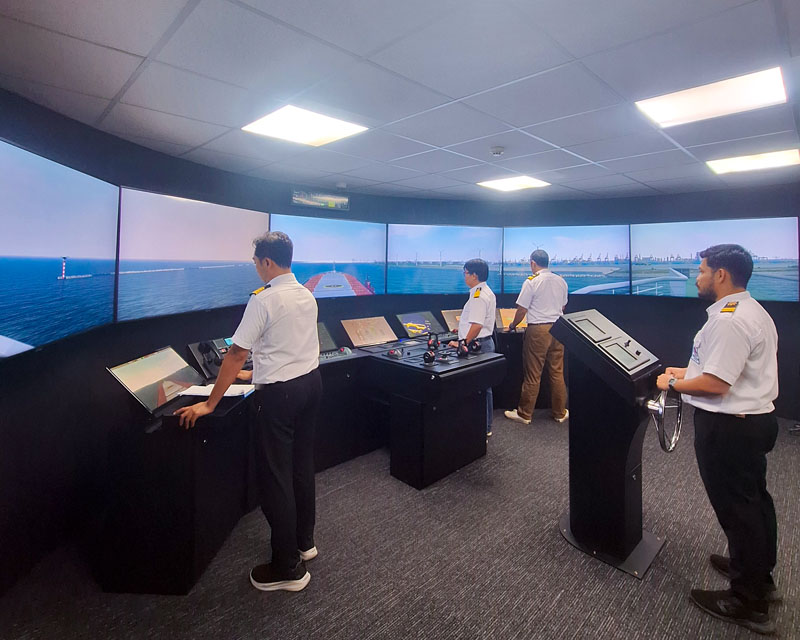
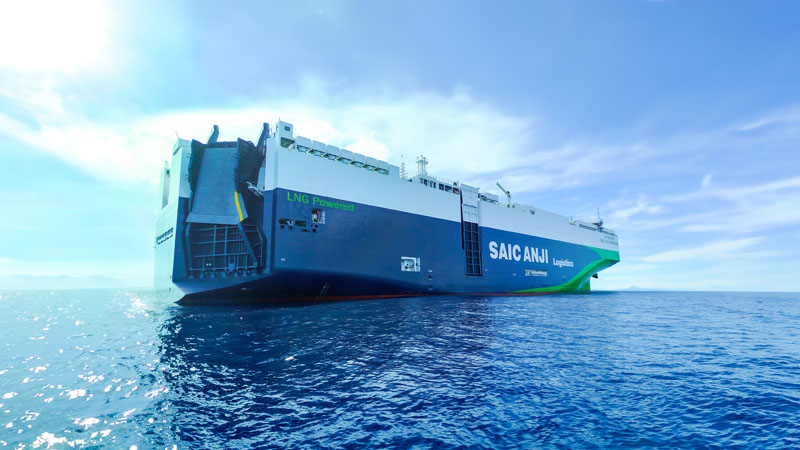
Wallem Group has a team of over 6,000 seafarers and operates in 19 countries worldwide.
The analysis of three ship management companies regarding the prospects of Hong Kong's shipping industry are very similar to ours. The institutional system advantage of "part of China but outside the Mainland" enjoys by Hong Kong is what makes us unique. We will make every effort to maintain Hong Kong's international environment while enhancing our maritime competitiveness through various tax incentives and support measures. In recent years, we have introduced tax incentives for ship operator, ship leasing, maritime insurance-related business, and shipping commercial principals. For many years, ship operators have benefited from tax exemptions on income derived from the international operations of registered ships in Hong Kong. Our latest measure, the Block Registration Incentive Scheme in Hong Kong Shipping Registry (HKSR) will be implemented on February 14 this year. We hope to attract more shipowners to register their ships in Hong Kong. Under the Scheme, if more than one eligible ship is registered with the HKSR within 24 months, the owners of the ships concerned may be provided with a refund of the ship registration fee and the first-year annual tonnage charge.
Connecting both the Mainland and the world
In addition to consolidating Hong Kong's international maritime advantages, we have also continued to strengthen our connections with the Mainland. Recently, I visited Nanning, Guangxi, the southwestern gateway of the country, marking my first official visit as the Secretary for Transport and Logistics.
In recent years, the country has been actively building the "New Western Land-Sea Corridor," making Guangxi an important hub for connecting the southwestern region of the country with ASEAN through both water and land routes. During the trip, we visited the Nanning International Railway Port and the China-Singapore Nanning International Logistics Park. The Nanning International Railway Port is Guangxi's largest railway logistics centre and serves as a key departure point for important international freight trains, including the China-Vietnam and China-Europe freight trains. This visit allowed us to gain firsthand insight into the types of goods transported through Guangxi under the "New Western Land-Sea Corridor," as well as future key cargo types and markets for development.
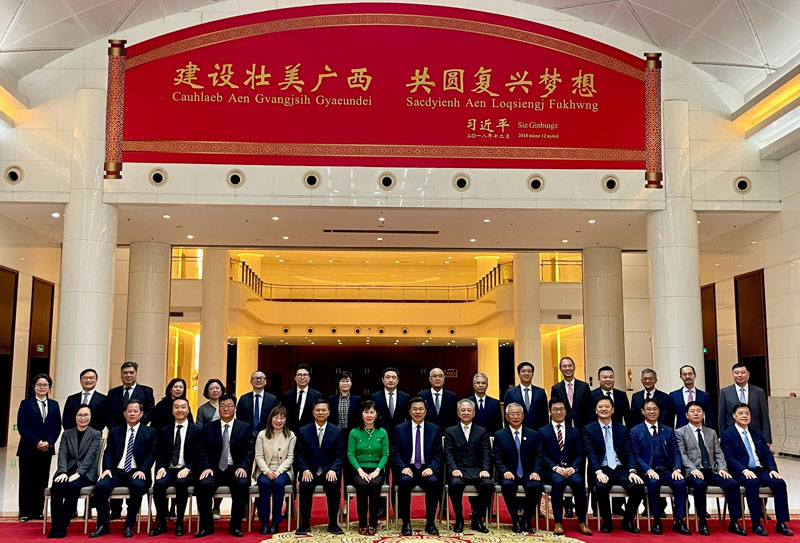
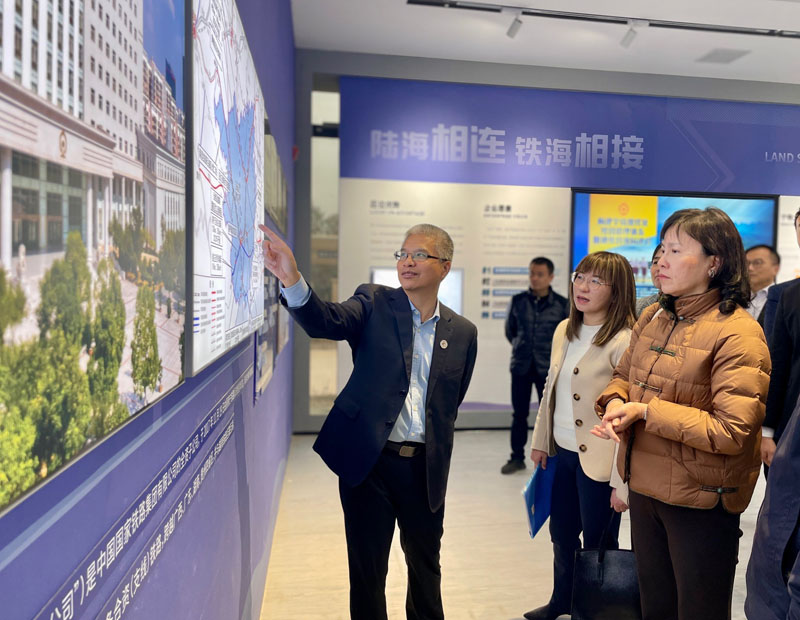
I led members of the LOGSCOUNCIL, along with colleagues from Hong Kong Customs and Excise Department and the Marine Department, on a visit to Guangxi.
During the trip, we were hosted by the People's Government of the Guangxi Zhuang Autonomous Region and the Department of Transport, allowing us to taste Guangxi's three famous rice noodle dishes: Laoyou noodles, Guilin rice noodles, and Liuzhou Luosifen, which left a lasting impression. However, what impressed us even more was our deepened understanding of Guangxi's rich natural resources. A significant amount of live pigs and vegetables supplied to Hong Kong come from Guangxi, and the clementine is a local specialty. Guangxi also produces a large quantity of natural spices; for instance, it accounts for nearly 90% of the country's star anise production, earning it the title of the "Kingdom of Spice Plants". Moreover, Guangxi is rich in mineral resources and has made significant progress in industries such as metal processing and automobile manufacturing.
The potential for cooperation between Guangxi and Hong Kong in the logistics sector is immense and has started long ago. We signed an agreement on Guangxi-Hong Kong Transportation and Logistics cooperation back in 2016, and last May we further signed the "Framework Agreement for Deepening Strategic Cooperation of the Guangxi-Hong Kong Transportation and Logistics", strengthening collaboration between the two regions. On business level, many Hong Kong-invested enterprises have already taken the lead in establishing shipping and logistics cooperation with Guangxi. For example, a Hong Kong terminal operator signed a memorandum of cooperation with Guangxi Beibu Gulf International Port Group last May to enhance multimodal transportation collaboration. The foundation of cooperation between Hong Kong and Guangxi, combined with this visit, reinforces my belief that Hong Kong can play the role of a "super connector" to assist Guangxi’s logistics and maritime sector in attracting investments and expanding its reach. I am very grateful to the members of the LOGSCOUNCIL for working together with the HKSAR Government to explore new sources of goods and broaden the logistics and shipping landscape for Hong Kong. I would also like to thank the colleagues from the Customs and Excise Department and the Marine Department who joined our delegation, enabling us to address the bottlenecks and pain points in the logistics chain during our discussions with the Guangxi authorities.
Hong Kong's port development is with century-old foundation. We have world-class port infrastructure and a strong shipping tradition, built on the efforts of those who came before us. We must cherish this foundation. I will focus on promoting the port industry to actively expand cargo volume and business and seeking new growth points. We will continuously enhance the competitiveness and efficiency of the port by going smart, green, and digital. We will also do our best to assist Hong Kong's shipping companies in showing their potential and make good use of Hong Kong’s finance, legal and institutional strengths to develop and promote our high value-added services to the rest of the world.